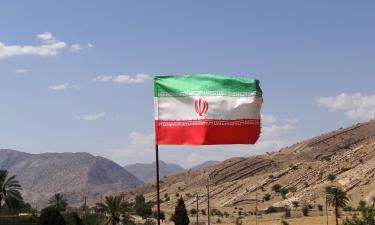U.S. Treasury's Office of Terrorism and Financial Intelligence
Using Tax Exempt Groups to Sanction Russia and Iran, Distort U.S. Policy

by John Stanton
"The Justice department would like to the see the UANI lawsuit go away as it is aware that what is being described as "law enforcement" documents would include both privileged and classified Treasury Department work product relating to individuals and companies that it has investigated for sanctions busting. Passing either intelligence related or law enforcement documents to a private organization is illegal but the Justice Department's only apparent concern is that the activity might be exposed. There is no indication that it would go after UANI for having acquired the information and it perhaps should be presumed that the source of the leak is the Treasury Department itself." Phil Giraldi
"Enforcing those AIPAC-endorsed sanctions has been the happy task of the U.S. Treasury's Office of Terrorism and Financial Intelligence. Created in early 2004 after intensive lobbying by AIPAC and its associated think tank, the Washington Institute for Near East Policy, the TFI unit has been aptly described as "a sharp-edged tool forged principally to serve the Israel lobby." With David S. Cohen succeeding Stuart Levey as Under Secretary for Terrorism and Financial Intelligence in January 2011, a leading journalist on the Middle East was later prompted to call the position "a job which seems reserved for pro-Israeli neo-cons to wage economic warfare against Tehran." In recent days, Cohen's TFI unit has been eagerly waging economic warfare against Damascus. Daniel L. Glaser, the Assistant Secretary for Terrorist Financing, has just completed a tour of Lebanon and Jordan to secure their compliance with economic sanctions against the Assad government. In Beirut, the U.S. Embassy announced that Glaser was pressing the authorities to "remain vigilant against attempts by the Syrian regime to evade U.S. and EU sanctions." Maidc O Cathail
So now that U.S. Attorney General Eric Holder has invoked the U.S. States Secret privilege in the matter of Victor Restis & EST v United Against Nuclear Iran, American citizens might come to understand why foreign nations like China, Russia, Egypt and the United Arab Emirates treat American non-profits or non-governmental organizations (NGO's) with scorn. And now United Against Nuclear Iran has created another non-profit known as the Counter Extremism Project (CEP). CEP has none other than Elliot Abrams on its board of directors along with the same cast of leaders that advise UANI.
Some of these U.S. Internal Revenue Service tax-exempt, 501C3 .org's, or "Associations", operating overseas are nearly the equivalent of U.S. embassies: U.S. intelligence operatives and free market ideologues populate leadership and staff positions. Funding for their operations are a mix of U.S. government and corporate largesse. Private donations figure as well. In some cases they are not-so-subtle advocates for regime-change.
Robert Merry's piece April 2012 piece in The Atlantic does a fine job of pointing out some of the more nefarious activities of NGO's and non-profits. In Why Do Some Foreign Countries Hate American NGOs So Much? Merry opines: "For anyone trying to understand why this anger is welling up in those countries, it might be helpful to contemplate how Americans would feel if similar organizations from China or Russia or India were to pop up in Washington, with hundreds of millions of dollars given to them by those governments, bent on influencing our politics. One supposes it would generate substantial anger among Americans if these groups tried to tilt our elections toward one party or another. But suppose they were trying to upend our very system of government, as U.S.-financed NGOs are trying to do these days in various countries--and have done in recent years in numerous locations.
Americans have a network of Israel-First organizations in the United States that are "bent on influencing our politics". They constitute a Deep State that has no remorse in sacrificing American lives and security for the benefit of Israel. Two of these non-profits are United Against Nuclear Iran (UANI) and the Foundation for the Defense of Democracies (FDD). They are part of the local, state and federal matrix of Israel-First non-profits in the U.S.
UANI has managed to get 40 American state legislatures to pass, nearly unopposed, draconian sanctions on Iran which clearly are meant to instigate the general populace to revolt. UANI claims credit for many pieces of federal legislation designed to strangle the Iranians and inflict damage of the type that sanctions leveled on the Iraqi civilian populace caused.
"UANI develops model legislation for adoption by the federal government and U.S. state governments to sever Iran from international trade and financial markets and prohibit investment in Iran. UANI's model legislation provisions were included in the federal government's Comprehensive Iran Sanctions, Accountability, and Divestment Act of 2010 (CISADA), and in debarment legislation adopted in California, Florida, New York, Indiana, Maryland and Connecticut that bars companies with Iran business from receiving taxpayer dollars."
FDD spearheads a similar program: "FDD's work has informed numerous pieces of Iran sanctions legislation, which were passed with overwhelming bipartisan congressional support, and which are now U.S. law, including the Iran Freedom and Counter-Proliferation Act of 2012 (included as part of the National Defense Authorization Act of 2013); the Iran Threat Reduction and Syria Human Rights Act of 2012; Section 1245 of the National Defense Authorization Act of 2012; and, the Comprehensive Iran Sanctions, Accountability, and Divestment Act of 2010. These laws target Iran's energy, financial, shipping, insurance, commercial, and proliferation activities, and the regime's human rights abuses. The legislative measures are widely viewed as the most robust U.S. measures yet imposed against the Iranian regime. European and Canadian officials also relied on FDD research to inform their complementary sanctions policies. Beyond gasoline, the Iran Energy Project also seeks to reduce the amount of oil revenue the Iranian regime can devote to advancing its illicit nuclear program and repressing its citizens. As part of this effort, FDD has performed studies on sanctioning Iran's Central Bank, the role of the IRGC in Iran's energy sector, and the impact of a worldwide Iranian Oil Free Zone."
According to Phillip Weiss, the US Joint Chiefs of Staff were prophetic: "In late 1947, the JCS had written that 'A decision to partition Palestine, if the decision were supported by the United States, would prejudice United States strategic interests in the Near and Middle East to the point that United States influence in the area would be curtailed to that which could be maintained by military force.' That is to say, the concern of the Joint Chiefs of Staff was not with the security of Israel-but with the security of American lives."
And so it has come to pass that the U.S. has sustained the existence of Israel through trillions (US dollars) in foreign assistance (since 1947). The U.S. has tolerated espionage and the theft of American technology, military secrets and nuclear weapons design. The U.S. government and media have been so bent by Israel-First influence that it is nearly impossible to openly criticize Israel about its thinly disguised destruction of the Palestinian people.
It just does not seem enough for the Israel-First network. How much more must Americans sacrifice for the sake of Israel? When will the big dog set things right and get the tail to begin to obey? Few Americans want to abandon Israel but to see the United States of America getting bent over the knee by Israel is unsettling.
And with the U.S. Attorney's invocation of the State Secrets privilege now providing cover for UANI's operations, it is obvious what is afoot. Circumstantially, the evidence is damning: U.S. and Israel intelligence data seems to be moving between UANI, FDD and the Office of Terrorism and Financial Intelligence in the U.S. Treasury. The three organizations form a sort of a privatized sanctions enforcement regime apparently benefiting from government intelligence operatives and/or business intelligence snoops. Where you find David S. Cohen of the Office of Terrorism and Financial Intelligence you will also find some link to UANI or FDD. And then there is the fear factor: Financial sanctions, loss of business in Israel, and loss of political office in the U.S. How two non-profits became so powerful and feared is a testimony to the strength of the Israel-First organizations and their ability to bend the political consciousness of the United States of America
Some Items for "You" to Explore
"From: Bart Mongoven
To: Reva Bhalla
Sent: Wednesday, April 21, 2010 2:49:34 PM GMT -06:00 US/Canada Central
Our mission (in the short term) is to determine how much flexibility is in the seemingly inflexible demand that the client...Client is Honeywell, which makes surveillance equipment Iran uses to monitor/secure pipelines and (allegedly) nuclear reactors...get out of Iran "right now." The client says that it will not sign another contract but that it does not want to breach contracts that are in place. This is the position that Ingersoll Rand and Siemens have taken, and it seemed ok with UANI. At the same time, UANI is telling our client that the same pledge isn't good enough. Is UANI still in talks or putting similar pressure on those who have pledged that they will leave when current contracts are up?...How did they decide to start targeting corporations -- is there a model it is following (like the Save Darfur coalition or something else)? How do they choose their small list of targets since there are so many companies operating in Iran? Do they know people at the corporations they target? How closely do UANI and FDD work? Are there any deadlines in Iran -- elections, feared nuke tests, coming deaths of really sick clerics, etc., that requires FDD and UANI show progress quickly?"
"As for the Marc Rich case, former federal prosecutor Andrew McCarthy accurately described it as "one of the most disgraceful chapters in the history of the Justice Department." Congressional investigators called it "unconscionable." Fugitive commodities trader Marc Rich, on the run for evading nearly $50 million in taxes, found the best lawyer he could buy: former Democratic White House counsel and intimate friend of Eric Holder, Jack Quinn. Despite his denials, memos showed Holder knew of the pardon in advance, failed to notify prosecutors and the FBI that it was coming, "and even gave Quinn public-relations advice on getting out the 'legal merits of the case.'" The evidence clearly shows Holder and Quinn violated department protocols and colluded to keep the Justice Department out of the pardon deal.'
"The central issue in this case involves an allegation that the defendants, as senior officers, managers, agents and nominees for the Bank of Credit and Commerce International ("BCCI"1), illegally and secretly sought to acquire ownership and maintain control of First American Corporation: FIRST AMERICAN CORP., et al., Plaintiffs, v. Sheikh Zayed Bin Sultan AL-NAHYAN, et al., Defendants....United States District Court, District of Columbia. November 26, 1996. William Horace Jeffress, Jr., Herbert John Miller, Jr., Douglas Frank Curtis, Martin David Minsker, David S. Cohen, Miller, Cassidy, Larroca & Lewin, L.L.P., Washington, DC, William B. Shields, Washington, DC, for defendants Clark M. Clifford, Robert Alan Altman."
"David S. Cohen...Treasury undersecretary for terrorism and financial intelligence, who oversees the OFAC sanctions effort, reportedly following meetings with Israeli officials, said last week's actions were meant to "tighten the screws and intensify the economic pressure against the Iranian regime. "The US is counting on the Iranian people to turn against and overthrow their government because of sanctions-induced hardships...In reality, the sanctions target the civilian population and the "Iranian regime" won't be much affected... Despite the public relations language that "food and medicine are exempted from the brutal US-led sanctions, as OFAC well knows, the reality is something else. They know well the chilling effects of the sanctions on international suppliers of medicines and food stuffs with respect to a targeted country. The US Treasury department has thousands of gigabytes of data confirming that the boards of directors of international business do not, and will not allow their companies to risk millions of dollars in profits by technically violating any of the thousands of details in the sanctions -- many of which are subject to interpretation -- for the sake of doing business with Iran or Syria."
"More about Stuart Levey's intimate connections to both the US Treasury and the Justice Department: After leaving the Treasury Department, Mr. Levey was a Senior Fellow for National Security and Financial Integrity at the Council on Foreign Relations. Prior to his Treasury appointment, Mr. Levey served as the Principal Associate Deputy Attorney General at the US Department of Justice, having previously served as an Associate Deputy Attorney General and as the Chief of Staff of the Deputy Attorney General. Where is Stuart Levey today? Why, he's on the HSBC Board of Directors as the Chief Legal Officer of HSBC Holdings plc, the parent company of HSBC operations worldwide. We got all this information about Mr. Levey from his HSBC bio page. There we learned that he has been the drug money-laundering megabank's Chief Legal Officer since January 2012. Thus, he would have been intimately involved in (and legally responsible for) the crafting of HSBC's December 2012 Get Out of Jail Free settlement with the Justice Department. Intelligence from David S. Cohen's group at Treasury must have also played a role in advising Justice on the historic settlement."
David S. Cohen, Office of Terrorism and Financial Intelligence: "Increasing Iran's Isolation...First, we will continue to identify ways to isolate Iran from the international financial system. We will do so by maintaining our aggressive campaign of applying sanctions against individuals and entities engaged in, or supporting, illicit Iranian activities and by engaging with the private sector and foreign governments to amplify the impact of these measures. As part of this effort we will also target Iran's attempts to evade international sanctions through the use of non-bank financial institutions, such as exchange houses and money services businesses. And we will explore new measures to expand our ability to target Iran's remaining links to the global financial sector. In particular, we are looking carefully at actions that could increase pressure on the value of the rial. In that connection, we will continue to actively investigate any sale of gold to the Government of Iran, which can be used to prop up its currency and to compensate for the difficulty it faces in accessing its foreign reserves. We currently have authority under E.O. 13622 to target those who provide gold to the Iranian government and, as of July I, IFCA will expand that authority to target for sanctions the sale of gold to or from anyone in Iran for any purpose.
John Stanton
Subscribe to Pravda.Ru Telegram channel, Facebook, RSS!





